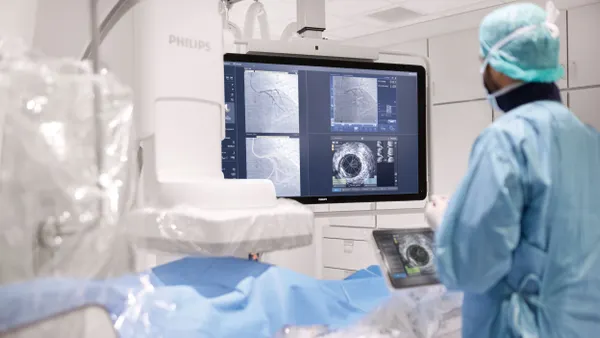UPDATE: April 22, 2022: Philips is investigating a possible link between the company's recent recall of ventilators and one patient death and four reports of patient harm.
The Food and Drug Administration earlier this week in its database flagged the Class I recall related to an electrical circuit fault in all models of the Philips Respironics V60 ventilator that can cause the breathing devices to stop working.
"Out of an installed base of approximately 100,000 devices globally and millions of uses, to date Philips had received four reports of patient harm and one report of patient death potentially associated with this issue. We take these events very seriously and they are still under investigation, so we cannot provide an update yet," said a company spokesperson in an emailed statement.
An FDA spokesperson in an emailed statement said it is "working closely" with Philips Respironics to assess the company's recall investigation and "any associated injuries" but made no mention of the report of a patient death potentially tied to the ventilator malfunction.
"We will inform the public of any significant new information resulting from our assessment," according to the agency's statement.
Philips Respironics on March 14 issued an "urgent Medical Device Correction" advising customers to "verify the operation of any nurse call/remote alarm device" before using the company's V60 and V60 Plus ventilators in order "to prevent possible patient injury due to non-annunciating alarms," according to the FDA's database.
Philips Respironics on Friday issued a voluntary recall notification and field safety notice for the V60 ventilator product family. "In connection with this recall notification/field safety notice, Philips has taken a provision in the fourth quarter of 2021," the press release stated.
Dive Brief:
- The Food and Drug Administration has alerted healthcare professionals to another problem with Philips ventilators, flagging up a Class I recall related to a fault that can cause the devices to stop working.
- Respironics California, part of Philips, began the recall of more than 87,000 V60 and V60 Plus ventilators last month after identifying an issue with an internal electrical circuit. Because the fault can cause the devices to shut down without sounding an alarm, Philips is asking users to take action to ensure any problems are detected quickly.
- The recall is the latest in a series of quality actions related to Philips' respiratory devices dating back to when the company began pulling millions of sleep apnea products and ventilators from the market last summer. As analysts at Jefferies predicted, the latest recall had little impact on Philips' share price.
Dive Insight:
The Philips recalls have mounted up over the past 10 months. Weeks after beginning a recall related to its sound abatement foam, Philips issued a separate alert about the potential for V60 ventilators to give patients a lower oxygen flow rate. Then, Philips began 2022 by recalling V60 and V60 Plus ventilators over the use of an expired adhesive that could cause the devices to fail.
The FDA added another Class I recall to the growing set late last week. Philips began the recall last month and, as is typical, there was a lag before the FDA added it to the database and assigned it to a class based on the risk it poses.
In a note to investors, Jefferies analysts said Philips identified the issue through postmarket surveillance. Philips has reportedly received six reports of shutdowns without alarm across the installed base of close to 90,000 devices. The ventilators are used to augment breathing, rather than for life support, but the FDA still sees the fault as posing a risk to life and Philips wants users to mitigate the risk.
Philips said users must implement one or more of three mitigating measures. The company is "strongly" recommending that users adopt a nurse call/remote alarm to "provide a backup signal to the clinician even if the ventilator's primary alarm system does not activate."
The other options are to implement an oxygen analyzer with appropriate alarm settings and to monitor the patient with pulse oximetry. Philips wants sites to have an alternative means of ventilation available in case their V60 devices fail.
If sites are unable to implement those mitigating measures, Philips is advising them to "make a decision that balances the risks and benefits of continued use of the V60/V60 Plus and V680 against the risks and benefits of ceasing use and/or substituting other ventilators."
David Ferguson, business leader of Philips Respironics, set out the next steps in an emailed statement: "We have created a dedicated team that is focused on addressing the current issue and providing technical assistance where needed. Philips Respironics will provide regular updates to you on the development of its plan to address the issue, with the first update to be provided no later than June 30, 2022."












